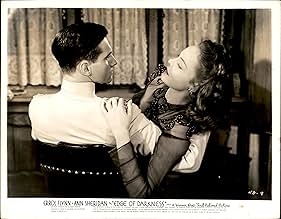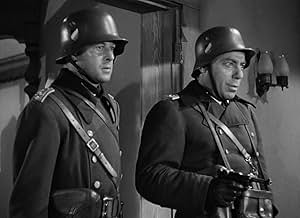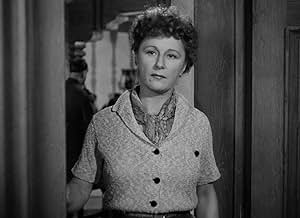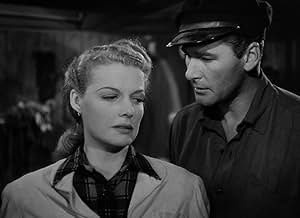Ajouter une intrigue dans votre langueAfter two years under German rule, a small Norwegian fishing village rises up and revolts against the occupying Nazis.After two years under German rule, a small Norwegian fishing village rises up and revolts against the occupying Nazis.After two years under German rule, a small Norwegian fishing village rises up and revolts against the occupying Nazis.
- German Lieutenant
- (uncredited)
- Townsman
- (uncredited)
- Petersen
- (uncredited)
- Maj. Ruck
- (uncredited)
Avis en vedette
However, this movie is a cut above other propaganda movies. The cast is excellent, top-notch all the way: Errol Flynn, Ann Sheridan, Walter Huston, Ruth Gordon, John Beal, Helmut Dantine, Judith Anderson and Morris Carnovsky.
Sometimes on the IMDb message board, a poster will ask for opinions on the best ensemble cast ever assembled. This one deserves a mention.
It's probably not at the top of everyone's list because it was released while Errol Flynn was fighting statutory rape charges, which was a distraction to audiences, certainly, and also because it followed "Casablanca."
Norway was dragged into the World War II conflict because Hitler was very concerned about protecting the Norwegian shoreline so that the Russians could not receive supplies if they joined the Allies.
In the story, the village is being occupied by the Nazis, who are taking the people's shipments of basic necessities and oppressing the entire town by their very presence - curfews, patrols, and the commandeering of the local hotel as their base.
Flynn plays the head of the resistance, a brave fisherman named Gunnar Brogge. He is joined in the fight byand by other villagers and by the woman he loves, Karen Stensgard (Sheridan). Her father (Huston) is a doctor who, like many others, has been content not to make waves; his wife (Gordon) longs for the days before the war when the family was together.
Karen, however, has no such wish - her brother, Johann (John Beal) is a weakling who collaborated with the Nazis in Oslo. Hearing that he's returning home, she warns the resistance group that he could cause problems. Meanwhile, the group waits to receive a shipment of arms so that they can fight effectively.
The director, Lewis Milestone, has created an atmosphere where one feels the oppression, fear and frustration of these simple people. There are powerful scenes that demonstrate the viciousness of the Nazis, led by Helmut Dantine.
One scene is off-camera - the rape of Karen. As another poster here commented, she of course looks fabulous when she returns to the group - some dirt smudges and her beautiful hair falling around her face. That is really the one false note in this story of great bravery.
The entire cast is terrific, led by Flynn, who demonstrates quiet strength and determination as Gunnar. This is really an ensemble piece, however, and Flynn and Sheridan do not overwhelm the production.
Walter Huston again demonstrates his brilliant acting skills as a man trying to stick it out without having a high profile, and Gordon is sympathetic as his wife, who yearns for the family moments that are now gone. All of the roles, including the smaller ones, are essayed beautifully.
I am sure that this film was very inspirational when first seen, particularly the radio message from Roosevelt at the end of the movie. "Edge of Darkness" is a compelling story about the effect of the war and occupation on the average person.
The cast is excellent. In addition to the three big stars I list above, who all do commendable work, there's an outstanding supporting cast. Judith Anderson is a ballsy resistance fighter who is in love with one of the Nazis but doesn't let that sway her loyalty. Ruth Gordon gives one of her patented sensitive and soft-spoken performances. Charles Dingle and John Beal play the rat bastards who sell their own out to the enemy. One of them has a moment of redemption by the end. Morris Carnovsky is extraordinary as an elderly man who stands up to the Nazis despite the danger. Roman Bohnen is a scene stealer as a patriot who has to overcome his fear. Helmut Dantine plays the scar-faced Nazi in charge of the occupation. Many other fine actors in small parts, some of whom may only get one scene to make an impact but they make the most of it.
Powerful script, beautiful cinematography, and excellent direction. The climactic battle scene is intense. It's an unflinching war movie with little to no comic relief, a rarity for Warner Bros, who usually threw Alan Hale or somebody into these pictures to add some lighter moments. But this is a serious movie about bravery and the sacrifices that so many made in the war. The story doesn't call for lightheartedness. It's one of the best war movies Flynn or WB made.
Leading man Errol Flynn turns in perhaps his best job of acting. His dashing image is completely lost in the role of a humble fisherman not entirely confident as the leader of the local Resistance movement. No dashing uniform here, just a pea coat and a plain merchant sailor's cap. And no mustache! Flynn and leading lady Ann Sheridan both turn in the solid, understated performances their roles called for, but it is a superb cast of supporting players that really shines in this one. One of the great charms of this memorable movie is the rich character development amongst the supporting parts. Walter Huston, as the town doctor trying to sit the fence, and Judith Anderson, as a Resistance worker hopelessly in love with a German soldier, are dominating as always. But the show is practically stolen by Roman Bohnen, as a henpecked, middle-aged store keeper with dreams of glory, and the ubiquitous Henry Brandon, as a suave SS officer who may not be all he seems. Helmut Dantine, a refugee Austrian anti-Nazi in real life, plays the German commandant with razor-edge ruthlessness. Likewise outstanding are Ruth Gordon as the doctor's sadly unbalanced wife, Charles Dingle as her Quissling brother, John Beal as her wavering Quissling son, and Nancy Coleman as the commandant's frightened Polish mistress. Monte Blue, Frank Wilcox, Art Bridge, and Morris Carnovsky add their always reliable presences. Thanks to consummate acting skill, Rossen's intelligent script, and Milestone's precise direction, you will come to know these characters as well as your neighbors by the shattering end of this two hour movie.
Franz Waxman's florid score themed on Martin Luther's stirring hymn "A Mighty Fortress Is My God" with snatches from Wagner sweeps the action along to a rousing climax.Sid Hickox is credited for the sublime cinematography, but as I have stated elsewhere (see my review of The General Died At Dawn), Milestone's graphic statement was the same no matter who was behind the camera or in the editing room. Sweeping camera, silky smooth scene changes with creative dissolves, panning mise-en-scene were all the master's trademarks -- much imitated and highly influential on the film noir style that came to dominate pictures of all genres during the 1940's. Notice how at the beginning of the final scene in Edge of Darkness the flapping flag dissolves into a sheet of paper in a typewriter!
Edge of Darkness is a classic of the war/intrigue genre and one of the great movies of all time. First rate Old Hollywood entertainment from the master Lewis Milestone.
There was a popular sub-genre of war picture during the war years that centered on common European folk rising up against Nazi occupiers. This is one of the best that I've seen, although the propaganda nature of the storytelling keeps it from being truly great. Another minor weakness lies in Flynn's character, a rather bland cipher with little to distinguish him. Flynn apparently felt the same himself and tried to get out of the movie, but in the end it turned out to be a quality picture on his resume. Sheridan is good, if a bit too made up for a Norwegian villager in her situation. I also liked Nancy Coleman as a Polish gal at the end of her rope, and Judith Anderson as a rather severe woman whose secretly in love with one of the occupying soldiers. The movie's explosive climax seems light years away from director Milestone's work 13 years previously on what is arguably the greatest anti-war film, All Quiet On the Western Front.
Le saviez-vous
- AnecdotesAccording to the book "The Films of World War II" by Joe Morella, Edward Z. Epstein and John Griggs, the production was beset by many problems. The book states, "Ann Sheridan parted from husband George Brent; Errol Flynn was indicted for rape; location shooting in a small California town was delayed several weeks because of fog, during which Ruth Gordon and Judith Anderson were besieged with telegrams from Katharine Cornell demanding their return to New York for her stage production of 'The Three Sisters'. Miss Gordon was restrained from leaving, but not before letting it be known that she hated Hollywood and the picture. Fortunately for Warners, the fog lifted, Flynn was acquitted, and the film was completed."
- GaffesAfter Gunnar (Errol Flynn) says to Karen (Ann Sheridan), "When my father was my age, he already had two children", there's an obvious jump cut indicating some dialogue had been deleted; this likely was due to a failure to gain acceptance by the Production Code censors.
- Citations
Captain Hauptmann Koenig: What do you want?
Sixtus Andresen: I... thought it only right, considering that you are... de facto commandant of the village, to acquaint you with a decision that I've made.
Captain Hauptmann Koenig: I'm very busy.
Sixtus Andresen: I know. I hope you'll forgive me. I know I'm being selfish. But, uhh... Why did you want my house?
Captain Hauptmann Koenig: For a block house! But what was it you wanted to see me about?
Sixtus Andresen: I cannot let you have my house.
Captain Hauptmann Koenig: You what?
Sixtus Andresen: I must forbid you to enter my house.
Captain Hauptmann Koenig: [laughs hysterically] Are you insane? I could have you shot!
Sixtus Andresen: I know. But if you're interested, I'll tell you what brought me to my conclusion, which is, I can assure you, completely unshakeable. You see, I am well past seventy, and at my age it would be foolish for me to be like Socrates' enemies, and fear death more than I love truth.
Captain Hauptmann Koenig: Go on!
Sixtus Andresen: ...I have no guns, no airplanes, no force. I disdain.
Captain Hauptmann Koenig: SILENCE!
Sixtus Andresen: What you don't understand is that the individual man...
Captain Hauptmann Koenig: QUIET, YOU FOOL!
Sixtus Andresen: - The individual man must stand against you like a rock.
Captain Hauptmann Koenig: [shaking Andresen] Will you STOP!
Sixtus Andresen: [calmly] No. If I were afraid, there might be hope for you, but I am not.
[Koenig slaps Andresen across the face]
Sixtus Andresen: There are certain things you cannot take away from me... What is mine, is mine. Do you think you can stop the working of my brain and my heart?
[slap]
Sixtus Andresen: We are not animals; we are men.
[slap]
Sixtus Andresen: That is the foundation of law - you cannot win.
[slap]
Sixtus Andresen: Where are your courts?
[slap]
Sixtus Andresen: Your judges?
[slap]
Sixtus Andresen: And your juries?
[slap]
Sixtus Andresen: Until you bring them forward, I must forbid you my house.
Captain Hauptmann Koenig: HE 'FORBIDS'!
[knocks the old man down the stairwell]
- ConnexionsEdited into The Extraordinary Seaman (1969)
- Bandes originalesA Mighty Fortress is Our God (Ein' Feste Burg)
(uncredited)
Traditional German hymn
Lyrics by Martin Luther (1535)
English translation by Frederick H. Hedge (1853)
Played and sung offscreen by an unidentified chorus during the opening credits, in the church,
and at the end
Variations in the score throughout
Meilleurs choix
- How long is Edge of Darkness?Propulsé par Alexa
Détails
Box-office
- Budget
- 1 653 000 $ US (estimation)
- Durée1 heure 59 minutes
- Couleur
- Rapport de forme
- 1.37 : 1
Contribuer à cette page






































